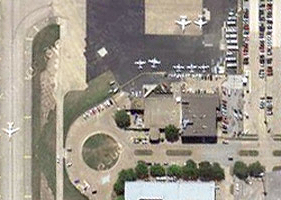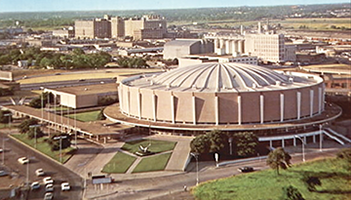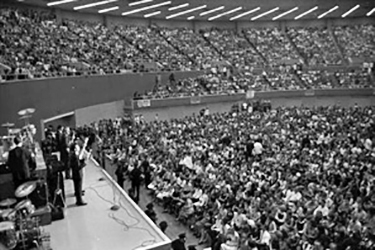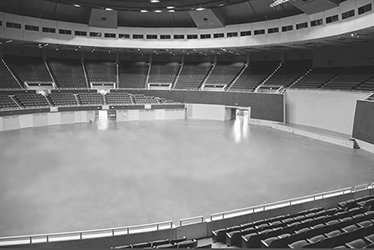A teenager at the 1964 Dallas Beatles concert
Roll Over Beethoven
Tuesday, mid-morning, January 14, 1964
Hour after hour, day after day, I Want to Hold Your Hand was playing on the radio. I rode my bicycle less than two miles to hear more of the album "Meet The Beatles!” Minsky's Records had four soundproof booths to sample new releases. The walls in Booth 3 were pegboard, painted a school-hall green with 'Terry loves Priscilla' penciled on one wall. The slight chemical smell of the vinyl wafted through the booth. There were others fidgeting and eagerly waiting for time in a booth, likely wanting to hear the same album. Convinced after two songs, I bought my very first record album - in mono. Mr. Minsky himself rang up $2.97 for my purchase. Heading home, I steered with one hand and held the flat bag in the other.
Taking residential streets to avoid traffic, I passed the late 1950s-era ranch houses that would later become popular as retro Mid-Century homes. At home, I, my brothers, and my mother gathered around the deluxe Hi-Fi cabinet in the living room to play the new album. This wasn't the typical sound of the day - Bobby Vinton, Lesley Gore, Gene Pitney. This was fresh and invigorating. Though the media hype was just beginning, we sensed this was going to be something very big. We listened to songs that would later become classics.
You Can't Do That
Sunday night, February 9, 1964, about 7:15p
The entire nation watched, well, at least 73 million of us - a record audience for a television show. Ed Sullivan introduced them,
“And, now, (some screams) something for (louder screams) the kiddos (pandemonium screams) - The Beatles".
The Ed Sullivan Show, was a popular variety show with puppets, circus acts, dancers, and, often, music for screaming teenagers: Elvis, Bobby Darin, and Bill Haley & His Comets’ Rock Around the Clock, the first rock and roll song broadcast on national television.
All My Loving was the first song sung by the Beatles followed immediately by Till There Was You. At the bottom of the screen were captions: 'Paul McCartney,' 'George Harrison,' 'Ringo Starr,' and 'John Lennon. Sorry girls, he's married.' For teenagers, it was euphoric. For my father and most adults, it was,
“Look at that long hair!” “What is this music?”
Three decades later, in New York City, I walked by the Ed Sullivan Theater on Broadway and noticed an open side door on 53rd Street. Curious, I went right in. The auditorium was somewhat of a mess - wood, tools, and debris - clearly a construction site. I stepped in towards the stage. As I took my first step onto the mostly barren stage, a voice called out,
"Hey!"
I played dumb. An unassuming security guard joined me on the stage.
“No one is supposed to be in here.”
I ignored that silly statement and asked him, with a smile and a non-threatening expression,
“Hi, what's going on in here?”
I had read that security guards in empty buildings often get lonely and hungry for human contact and conversation. Engaging him in banter, I hoped, would allow me time to look around.
The guard tersely explained that this was the new set for David Letterman. He seemed a bit surprised that I didn't know that. Letterman had just left NBC and had recently signed a contract with CBS. The security guy was younger so he was fascinated and starstruck by the Letterman set. I, too, was somewhat fascinated by Letterman’s set, but not nearly as much as I was by the fact that I was standing on the very stage where The Beatles held their first US performance years earlier. I looked out and recognized details in the theater auditorium that I had seen on the Ed Sullivan show on that Sunday night. Sure enough, the guard seemed to enjoy talking with me and our conversation lasted long enough for me to embrace this historic place.
Things We Said Today
February - September, 1964
Soon after the Beatles changed rock history on Ed Sullivan, I and three of my friends, Randy, Alec, and Rick, formed a combo. At that time, the term band referred to the troops of marching musicians who performed at halftime or professional musicians - The Rolling Stones were a band. Junior High wannabes were in combos. Randy and Alec played lead and rhythm guitar (John and George), Rick played bass (Paul), and I was the drummer (Ringo).
We started practicing, primarily for fun. Randy and Alec had jammed before. At the first meeting, at Rick’s house, we set up our equipment, played around with some notes, and settled into our roles. Rick’s parents had a separate playroom at one end of their house. They were the most accommodating and their house was the most convenient.
We agreed on the name Continentals partly because we fantasized about arriving at concerts and celebrity functions in a Lincoln Continental, a classy car at the time. A few ‘rehearsals’ later, Rick said,
“Guys, I don’t know about Continentals. One of the fan magazines had a story about a band recording under that name.”
We became the Impalas. My dad drove me to practices in his new Chevrolet Impala. The guys were all okay with the name. As the one with an interest in art, I painted the combo’s name on the drum head. Just as the Beatles had done. The Impalas played for some private parties given by friends. We made no money, but it was a chance to play before an audience. And it was fun.
I noticed a poster in the hallway:
Benjamin Franklin Junior High School is seeking acts for the Spring Talent Show.
Randy was in his next class. I got there in a hurry, not even stopping at my locker to drop off my morning books. Randy was about to enter the classroom. I told him of the talent show. After class, we went to the office to sign up The Impalas on the sheet on the counter, Spring Talent Show acts.
The guys were nervous, but eager to perform. The Impalas played their cover of Love Potion Number Nine, by the Searchers. That week, it had just become the number one song on the Top Forty chart. This was the first and final public performance by The Impalas. Their dreams were stronger than their talent.
Here Comes the Sun
Thursday, June 15, 1964, 5:10a

Tickets went on sale at only one place - a ticket agency inside Preston State Bank. I would often join my parents when they banked at Preston, so I knew it well. I shared my plan with a few friends and family. I would get up real early and ride my bike to the bank, a trip of about 2 miles, crossing only 2 major streets. My dad took me in the car the day before so we could map out the safest route. My dad was concerned but also accommodating of my desire, my need, to get those tickets.
That morning, too early for anyone but the paperboy and maybe some deliverymen, I woke up easily, put on my shorts and tee shirt, and quietly opened the side door to the garage. The larger car door was too noisy and I didn't want to wake the rest of the family, or the neighbors. I wheeled my bicycle around the garage to the driveway. I coasted down the gentle slope and was off in the cool dark morning. It was exhilarating - the slight discomfort from being out alone at this hour, the quiet city, and the darkness pierced by my bike light. But, mostly from the anticipation of what I was about to do - buy tickets to my first concert.
I followed the pre-determined route with no problem. Thanks to my dad. Past Neiman Marcus’ first suburban store and across the major but, mostly empty, street. At the ticket agency, I hitched up my bike to a post and walked past some empty parking places to the line that had begun forming the day before. Some people were in sleeping bags and had small coolers of food and drink. I took my place at the end of the line. We waited in the light of the bank building's floodlights, a community of music fans eager to see their idols, the original boy band.
Every now and then, a DJ from one of the local rock-and-roll radio stations would talk to those in line. There could have been a more festive atmosphere, but, most of us were just too tired and sleepy. Here comes the sun and the excitement level rose as the darkness faded away. The frenzy peaked when the ticket agency employees arrived and began to start their day - turning on lights and straightening the piles of stuff on their desks. Stacks of tickets were delivered to each desk. A security guard stepped to the glass doors and the ticket buyers could hear the clicks as the guard unlocked each of the two doors.
The line had straightened out and become quite orderly. We snaked inside, through the building lobby, and into the ticket agency. Across the hall sat the large open banking floor, still closed up and dark. There were four desks with agents seated at each to take orders. This was before computer technology and machines that spit out tickets.
The agent I was directed to reminded me that there was a limit of six tickets per person. I asked for six. The agent flipped through her stack of tickets to find the best seats. The tickets were $5.00 - my parents couldn't believe how expensive it was to go to a concert by a band with just four musicians. Tickets to the subsequent Dave Clark 5 and Rolling Stones concerts were six dollars!

I dug out three ten dollar bills from my jeans pocket and handed them to her; she handed me six tickets. I clutched the pieces of light cardboard as if I had just found some valuable treasure. Stepping out of the lobby and to my bike, I passed the rest of the line that was now very animated. I later learned that the concert, from this one ticket outlet, had sold out within a couple of hours. I made sure the six tickets with a rubber band around them were secure in the front pocket of my jeans and I unchained my bike for the journey home.
A Hard Day's Night
September 17, 1964, 1:30a
“Hey, get up. Let’s go.”
Bill stuck his head in the bedroom, waking me up. I hurriedly got dressed and brother Bill, old enough to have a driver's license, drove us a few miles to Love Field, the only Dallas airport at that time. We had heard on the radio that the Beatles would land at the site of the old terminal. That terminal building was no longer there, but there was still parking and easy access. We squeezed right up to the fence, close to the taxiway and apron. The excitement and energy in the air reminded me of the morning when I was about to buy tickets. But, now there were signs and banners, some being attached to the fence, some carried by the fans.
=================
There weren't many planes in the sky at that hour, so when a plane came into view, we just assumed it was the one with the Beatles aboard. It touched down and went almost out of sight at the end of the runway; then it turned and came back towards us. We realized that if it was going to the main terminal, it would have turned in that direction. But, it didn't. This was the one. The ground crew began to get the staircase ready. The plane stopped right in front of the fans, not too far from the fence. Every minute seemed longer due to anticipation. Finally, the staircase was rolled up to the door and someone walked up and knocked on the door. More agonizing wait. Then, the door opened. There they were.

They emerged waving and smiling. The sound of the jet engine continued even though they had already emerged. I realized the scream of the jet engine had merged with the screams of the fans and then it was just the fan screams that carried on. At the bottom of the staircase, they were given a few gifts, including four fab ten-gallon hats. They were escorted a few yards to a waiting limousine.
My brothers and I watched the black car drive off towards a gate in the fence. The horde of fans ran that way and onto a parking lot where we caught up with the limo. I was pressed right up to the window and sitting right there, a few inches away, were Paul and John. They were both smiling and watching the fandemonium on the other side of the glass. Some unknown stranger, was between them in the back seat. I didn't have time to see George or Ringo as the car had inched forward and the fans continued to press on the car. Once the limo got out of the parking lot and onto the street, it sped up and on to the Cabana hotel, designed by the same team that would later build Caesars Palace in Las Vegas in a similar design. A year before the Beatles stayed there, Raquel Welch was a cocktail waitress in the Cabana restaurant.


Above left: The fence about where I stood in 1964.
Above right: The circular drive was at the front of where the old terminal stood.
Below left: The Cabana Hotel. Below right: Memorial Auditorium.


Twist and Shout
September 18, 1964, 4:40p
Randy’s older brother drove the six of us to Memorial Auditorium in downtown Dallas. We had been awaiting this trip all day. The car parked in a large lot behind the round arena which sat there by itself. The Impalas joined the throngs of teenagers making their way to one of the lines that had formed outside the entrances. Apparently the doors hadn't yet opened. There was incredible energy and excitement in that line. Anticipation so great that it spilled out into the evening air.


Reps from The Beatles Fan Club were walking up and down the line repeating their disturbing message: if fans threw items up onto the stage, the Beatles might abruptly end the concert. One of them told a story of exactly that happening in one of the earlier tour stops. No one in the crowd wanted the concert to end early, so they all nodded their understanding and implicit agreement to obey the request.
As the crowd grew, the line became less of a line and more of a mob. An anxious excited mob. I was pushed right up against the glass doors. Soon, the doors opened. It could have been soon or it could have been a long time - I was so caught up in the excitement with fellow fans that the wait time was not much of an issue. We got in another line that moved up to the ticket takers and then on into the vast hallways that curved around the entrance tunnels to the arena seating. Walking up the stairs, emerging into the large UFO saucer space, was the most overwhelming thing I ever saw.
We found our seats. The arena was a bowl of activity, one could feel the electricity. It may have been something like my parents experienced at a Frank Sinatra concert. But to The Impalas, it was new and exhilarating. As the stated concert time neared, the anticipation heightened and became a force so powerful that its momentum caught up even those few older folks in the crowd. But, they had to wait a while longer - the concert would be delayed about 15 minutes. No one knew why. The anticipation stepped up a notch. Concert reviews mentioned that a bomb threat had been called in and the arena had to be searched.
The lights began to dim, section by section. New lights became apparent - the constant flashing of bulbs from flash cameras. An emcee, a local disk jockey, walked out onto the stage and spoke some typical emcee schtick, but, not too many were listening. He introduced the opening act, the Bill Black Combo. Most of the 10,000 people politely tolerated the opening groups. Next were The Exciters and Jackie DeShannon. Then the lights came back up in the arena and some stagehands came out onto the stage to rearrange the equipment. Ringo's familiar drum set with The Beatles painted on the front of the bass drum made its entrance from stage right. It seemed like the greatest event on earth, judging from the hysteria and screams over just seeing that drum.
The emcee returned to introduce the main act. No one was quite sure what the guy said as the screams overpowered his trained announcing voice. The lights dimmed again and it was on. The Liverpudlians appeared in their matching suits and went right into Twist and Shout. The screams were constant, but they were so tonally consistent that one could partially tune them out. After a couple of songs, Paul motioned for the audience to sit down. He wanted to say a few words, maybe about Texas or finishing the tour. As soon as the teens quieted enough for him to speak, he would begin. The sound of his voice cued the screaming to resume. He tried again. Screams again. On the third try, he just went ahead and said a few sentences and introduced their next song. The next 30 minutes were just a blur of constant screaming, music, and sheer joy.
As The Impalas were walking out through the lower level concourse, Alec noticed a throng of kids moving away from us, towards an exterior door. We followed and were soon outside at the stage door. I wanted an autograph. I reached down and picked up a hot dog wrapper. That’ll do.
The door opened, cuing stereo screams. False alarm. Just a roadie. Another opened door. Nope. A third time, John Lennon lead a small group of similarly black-clad guys along the rope barrier that had stretched between several stanchions. I finagled my way to the front.
John and George barely acknowledged the noisy jostling crowd, just some smiles and glances at the fans. Paul slowed down to talk, take photos, and sign autographs. As Paul got to me, the image reminded me of seeing Paul at the airport the day before. Paul picked up the pace and headed towards the limo. I was disappointed. But, Ringo was right there. I stuck the wrapper and pen towards him. Ringo took the paper and looked at me.
“Please make it to Jim and The Impalas.”
He did. One of the Beatles wrote out the name of a band from Ben Franklin Junior High. For me, the Impala drummer, it was the ultimate show souvenir.
The Beatles crawled into their limo, sped back to Love Field and to their waiting charter plane. Dallas was the final stop in the tour of 25 cities in one month. They spent a day at a ranch in Missouri to rest before going back to New York City for another taping of the Ed Sullivan show, then on home to Liverpool.
But for that evening in downtown Dallas, nothing else in the world mattered. This was Beatlemania and it reigned supreme. That evening in September was truly an evening I, the Impalas, and thousands of other teenagers will likely never forget.



Photos from the press conference and the concert in Dallas, 1964.






Brief YouTube video of the concert - someone added sound from another concert.

© James Robert Watson Email Text
More Stories from Jim's website